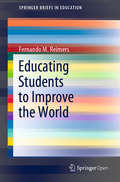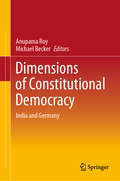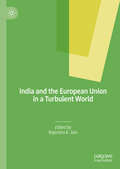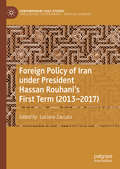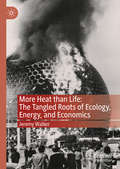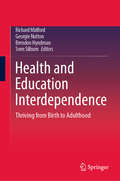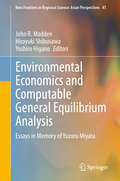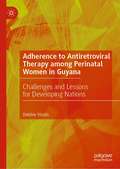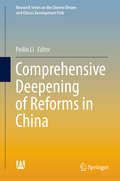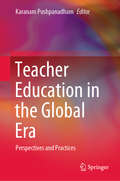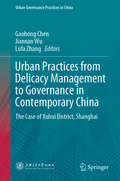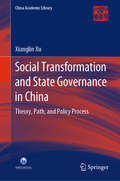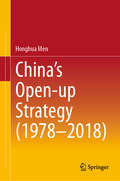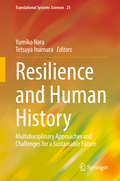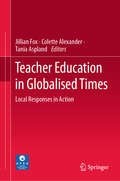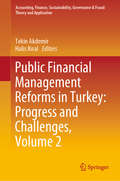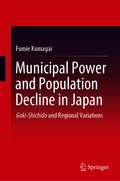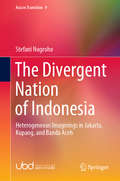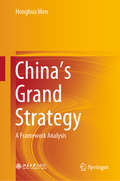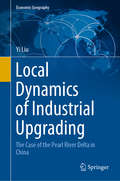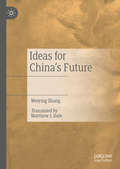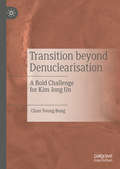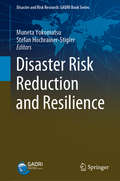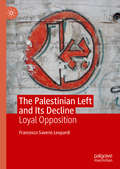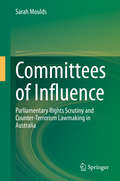- Table View
- List View
Educating Students to Improve the World (SpringerBriefs in Education)
by Fernando M. ReimersThis open access book addresses how to help students find purpose in a rapidly changing world. In a probing and visionary analysis of the field of global education Fernando Reimers explains how to lead the transformation of schools and school systems in order to more effectively prepare students to address today’s’ most urgent challenges and to invent a better future. Offering a comprehensive and multidimensional framework for designing and implementing a global education program that combines cultural, psychological, professional, institutional and political perspectives the book integrates an extensive body of empirical literature on the practice of global education. It discusses several global citizenship curricula that have been adopted by schools and school networks, and ties them into an approach to lead school change into the uncharted territory of the future. Given its scope, the book will help teachers, school and district leaders tackle the change management needed in order to introduce global education, and more generally increase the relevancy of education. In addition, the book offers a “bridge” for more productive collaboration and communication between those who lead the process of educational change, and those who study and theorize this important work.At a time when the urgency of our shared global challenges calls for more understanding and collaboration and when the rapid transformation of societies requires that we help students develop a clear sense of relevancy and purpose, this book offers a way to pursue deep and sustainable change in instruction and school culture, so that students learn that nothing human is foreign and that they can find meaning in lives aligned with audacious purposes to make the world better.
Dimensions of Constitutional Democracy: India and Germany
by Anupama Roy Michael BeckerThis book examines a selection of themes that have become salient in contemporary debates on constitutional democracies. It focuses in particular on the experiences of India and Germany as examples of post-war and post-colonial constitutional democracies whose trajectories illustrate democratic transitions and transformative constitutionalism. While transformative constitutionalism has come to be associated specifically with the post-apartheid experience in South Africa, this book uses the transformative as an analytical framework to transcend the dichotomy of west and east and explore how temporally coincident constitutions have sought to install constitutional democracies by breaking with the past. While the constitution-making processes in the two countries were specific to their political contexts, the constitutional promises and futures converged. In this context, the book explores the themes of Constitutionalism, Nationalism, Secularism, Sovereignty and Rule of Law, Freedoms and Rights, to investigate how the contestations over democratic transitions and democratic futures have unfolded in the two democracies. It offers readers valuable insights into how the normative frameworks of constitutional democracy take concrete form at specific sites of democratic and constitutional imagination in Dalit and Islamic writings, as well as the relationship between state and religion in the writings of public intellectuals, political and legal philosophers. The book also focuses on specific sites of contestation in democracies including the relationship between sovereignty and citizenship in post-colonial India, free speech and sedition in liberal democracies, questions of land rights in connection with economic and political changes in contemporary contexts, and the rights of indigenous communities with regard to international conventions and domestic law. Given its scope, it will be of interest to students and scholars of political theory, political philosophy, comparative constitutionalism, law and human rights.
India and the European Union in a Turbulent World
by Rajendra K. JainThe book examines how the European Union, which in the past had tended to be seen by India as an undervalued partner, is now increasingly part of most conversations in fields like the economy, technology, standards, best practices, development, defence and security.The book shows that the renewed focus on Europe is the result of changing geopolitics, India’s own priorities, Europe’s growing relevance in the post-Brexit era, China’s expanding footprint in the continent, and the search for alternatives to the loss of the UK as the gateway to Europe. The uncertainty inherent in the Brexit process and with the UK ceasing/having ceased to be the traditional gateway to Europe, India has been compelled to revisit, re-examine and rethink its own policies towards Europe and search for alternatives to Britain.
Foreign Policy of Iran under President Hassan Rouhani's First Term (Contemporary Gulf Studies)
by Luciano ZaccaraThe book deals with President Hassan Rouhani’s conceptual approach to foreign policy. It discusses the main pillars of thinking underpinning Rouhani’s administration and the school of thought associated with it, with a focus on issues pertaining to development as well as international relations. The signature of the “Joint Comprehensive Plan of Action” in 2015 showed the Iranian commitment towards the international requests on guarantees and transparency on its nuclear enrichment program. The book analyses the actual impact of the nuclear deal on the Gulf regional politics, with especial emphasis on the Iran-Saudi Arabia balance of power and the internal implications at political and economic level. It will assess the success or failure of the nuclear deal JCPOA as a foreign policy tool and it impact for Iran and the region. The book also analyses Iran’s relations with other gulf Arab states, Latin America, Africa and its ‘war on terror’ along with its allies Syria and Iraq.
More Heat than Life: The Tangled Roots of Ecology, Energy, and Economics
by Jeremy WalkerThis book traces the interacting histories of the disciplines of ecology and economics, from their common origin in the ancient Greek concept of oikonomia, through their distinct encounters with energy physics, to the current obstruction of neoliberal economics to responses to the ecological and climate crisis of the so-called Anthropocene. Reconstructing their constitution as separate sciences in the era of fossil-fuelled industrial capitalism, the book offers an explanation of how the ecological sciences have moved from a position of critical collision with mainstream economics in the 1970s, to one of collusion with the project of permanent growth, in and through the thermal crisis of the biosphere.
Health and Education Interdependence: Thriving from Birth to Adulthood
by Richard Midford Georgie Nutton Brendon Hyndman Sven SilburnThis book explores the interdependence of health and education, and how optimising this important relationship provides the foundation for achieving improved life outcomes from birth into adulthood. Adopting a multi-disciplinary approach, it draws on bio-medical, epidemiological, educational, psychological and economic evidence to demonstrate the benefits of the reflexive, positive associations between good health and educational attainment over the life course. In this, it offers readers insights into the complex nature of the nexus between health and education and how this relationship influences development. Health and Education Interdependence: Thriving from Birth to Adulthood is essential reading for education and health researchers and policymakers, teachers and public health and health promotion practitioners, as well as students studying in these fields.
Environmental Economics and Computable General Equilibrium Analysis: Essays in Memory of Yuzuru Miyata (New Frontiers in Regional Science: Asian Perspectives #41)
by John Madden Hiroyuki Shibusawa Yoshiro HiganoThis book addresses major issues such as a growing world energy demand, environmental degradation due to anthropogenic greenhouse gas (GHG) emission, and risk management of disastrous events such as pandemics, abnormal climate, and earthquakes. Using cutting-edge analytical tools, particularly computable general equilibrium (CGE) modelling, the analyses are focused on a very wide range of policy-relevant economic questions for the Asia-Pacific region, especially for Japan, China, India, Vietnam, and smaller nations, including Brunei, Timor Leste, and Fiji. The first part considers (a) the effects of climate change on agriculture sectors, energy policies, and future GHG emission trends, (b) adaptation to climate changes in energy policy and its impacts on the economies, and (c) risk management of catastrophic events such as global pandemics. The second part examines (a) energy environmental issues, (b) economic impacts of natural disaster and depopulation, and (c) effects of informatics development on risk management, using CGE modelling and other methods in regional science fields. Contributors are internationally active leading CGE modellers and environmental economists. The book should be greatly beneficial for scholars and graduate students as well as policy makers who are interested in the economic effects and management of risks relating to climate change and disastrous events.
Adherence to Antiretroviral Therapy among Perinatal Women in Guyana: Challenges and Lessons for Developing Nations
by Debbie VitalisThe book documents the history of the prevention-of-mother-to child transmission of HIV (PMTCT) program in Guyana, as well as the impact of HIV on pregnant and postpartum women’s adherence to antiretroviral therapy (ART). The book shows research work by reviewing the literature to investigate relevant adherence studies, presenting in-depth interviews on adherence perspectives of clinic patients and healthcare providers, and a cross-sectional descriptive study of pregnant women that investigated general adherence to pregnancy-related behaviours and ART, and the efficacy of a theoretical model (Health Belief Model) to understand and predict ART adherence within this group. Author discusses the factors affecting ART adherence among pregnant and postpartum women, since existing studies may not account for cultural and other local variations. The findings provide insight into the local situation, and will also inform policy and practice in Guyana, and the wider Caribbean Community (CARICOM).
Comprehensive Deepening of Reforms in China (Research Series on the Chinese Dream and China’s Development Path)
by Peilin LiThis book covers key issues related to comprehensive reform in China in a broad range of areas, such as the economy, politics, culture, social management, the environment and CPC Party building. The insightful analyses will appeal to social science researchers interested in reform-era contemporary China, as well as both undergraduate and graduate students trying to understand this country better. Lawmakers and policymakers at different levels of government will find in the well-informed policy recommendations following the analyses a valuable source of reference and inspiration.
Teacher Education in the Global Era: Perspectives and Practices
by Karanam PushpanadhamThis book discusses the perspectives and practices of teacher education programs in order to shed new light on the national priorities, policies, curriculum inputs, delivery mechanisms, challenges and future trends in 20 selected countries. It examines and compares the complexity of teacher education in international contexts, providing insights into educational change and reform in emerging democracies. Further, it includes cases from various countries that reflect how the profession is moving forward. In order to deepen readers’ understanding of teacher training and the challenges posed by globalization, the book concludes with a discussion of theoretical perspectives applied to teacher education, and with recommendations for new directions. Given its scope, the book is an essential read for teacher educators, students, and researchers working in the field of education.
Urban Practices from Delicacy Management to Governance in Contemporary China: The Case of Xuhui District, Shanghai (Urban Governance Practices in China)
by Gaohong Chen Jiannan Wu Lufa ZhangThis book focuses on the practice and experience of urban delicacy governance in Xuhui District, Shanghai. As we know, urbanization is the inevitable course for agricultural civilization to move towards industrial civilization. Over the past forty years, the urbanization of China has developed rapidly and has become an important push for economic development and social progress. At the same time, the rapid expansion of city scale, the shortage of public services, environmental pollution, traffic congestion, housing tension, as well as other urban pain points have emerged, and these have brought about serious challenges to urban governance. Delicacy management is the concentrated expression of modern scientific management theory and the inherent requirement to realize the modernization of national governance systems and governance capability. From delicacy management to delicacy governance, urban governance needs the transformation of logic. Shanghai has been identified as the only super city in the Yangtze River Delta and East China. It is of great significance to understand the theory and practice of urban governance in Shanghai. Meanwhile, Xuhui District is one of the seven central urban areas in Shanghai with a profound historical background, important institutions, advanced science and education.
Social Transformation and State Governance in China: Theory, Path, and Policy Process (China Academic Library)
by Xianglin XuThis volume is a selection of Chinese political scholar Xianglin Xu’s published works spanning nearly 20 years of research that explore and discuss the socio-economic transition in China under state political reform. Contextualized within the decades following the 80s, the author analyzes patterns observed from empirical studies, and breaks down the underlining reasoning, conditions and functionalities behind the incremental reform policies pushed forward by the Party and government.The collection is broken up into four sections: the first provides a general framework and theoretical / historical introduction to social transition research in the case of China; the second section discusses the underpinning logic behind political reform in China and practical concerns; the third section follows with discussions on reform policy practices within China including application and trajectory; the final section concludes with an analysis of reform within state institutional infrastructure and policy innovation.
China’s Open-up Strategy (1978–2018)
by Honghua MenThis book is devoted to go beyond the traditional contests and traditional theoretical framework to a new combination of domestic, regional, global visions of China’s Opening-up. It will be regarded as a research agenda based upon China's domestic strategy and international strategy and is committed to building China's open, scientific and complete national strategic system. Its main content are: Aiming to realize the great Chinese national rejuvenation, outline China's strategic thinking of opening to the world, sort out the strategic course of China's opening up, explore the strategic path of China's opening up, evaluate the strategic effects of China's opening up, and promote China's strategic innovations of opening up.
Resilience and Human History: Multidisciplinary Approaches and Challenges for a Sustainable Future (Translational Systems Sciences #23)
by Yumiko Nara Tetsuya InamuraThis unique book provides a platform for resilience research, combining knowledge from various domains, such as genetics, primatology, archeology, geography, physical anthropology, cultural anthropology, medicine, ecology, psychology, risk management and systems science, in order to examine specific concepts. The term "resilience" was originally used in psychology, but in current-day usage, it mainly refers to the "ability to recover from disaster"; however, the concept of resilience is still ambiguous. This book challenges readers to reconsider the concept of resilience comprehensively from diverse perspectives and to re-conceptualize it as an important framework applicable in various research fields. The book explores resilience by expanding the time and space scales to the maximum. On the time axis, it traces back to our human ancestors (and even to anthropoid apes) and follows the evolution of humans, the origin of agriculture, the rise and fall of ancient civilizations, and the present day. On the space axis, it discusses levels ranging from genetic; bacterial flora; individual, indigenous communities; and modern societies; to the global level. As such it expands the base for considering the problems facing modern society and selecting a future direction. In the long history of evolution, we Homo sapiens have faced, and overcome, various kinds of risks. By acquiring resilience, we have surpassed other animals and become apparent rulers of the earth; but, at the same time, we are also facing more serious risks than ever before. This book provides insights into addressing the challenges of a sustainable future.
Teacher Education in Globalised Times: Local Responses in Action
by Jillian Fox Colette Alexander Tania AsplandThis book provides commentary on the influence of multi-layered political contexts that surround the work of teacher educators worldwide. It addresses the drawbacks of the massification, standards-based movements and marketisation of universal business that threaten authenticity, innovation and entrepreneurship within teacher education on a global scale. The chapters celebrate the richly described local stories that explore the often tacit political activity that underpins teacher educators’ work. The book highlights the commitment of both teachers and teacher educators to social justice, and human rights and critical consciousness as central to the process of teacher development. Teacher formation, teacher education policies and curriculum development in an era of globalisation, super-diversity and the positioning of Indigenous populations, and national regulation and localisation are topics that are explored in this book.
Public Financial Management Reforms in Turkey: Progress and Challenges, Volume 2 (Accounting, Finance, Sustainability, Governance & Fraud: Theory and Application)
by Tekin Akdemir Halis KıralThis book provides an assessment of public financial management (PFM) reforms in developing countries using Turkey as a case study. Volume II elaborates on asset and liability management, intergovernmental fiscal relations, accounting, financial reporting, and auditing. Bringing together academics and practitioners, the book analyzes the PFM reforms in the light of theoretical explanations and practices to reveal the achievements, challenges, and future perspectives of PFM.
Municipal Power and Population Decline in Japan: Goki-Shichido and Regional Variations
by Fumie KumagaiThis book provides an insightful sociological study of the declining Japanese population, using statistical analysis to establish the significance of municipal power using demographic data on national, regional, prefectural and municipal levels. Penned by one of Japan's eminent sociologists, it provides a quantitative characterization of population decline in Japan with a focus on regional variation, and identifies the principal explanatory factors through GPI statistical software tools such as G-census and EvaCva, within a historical perspective. Furthermore, it offers a qualitative assessment of what constitutes ‘municipal power’ as this relates to regional/local revitalization as a means of addressing municipal population decline. Using Goki-Shichido as a theoretical framework, this book pays special attention to municipal variations within the same prefecture, presenting a completely unique approach. In combining these two dimensions of analyses, the book successfully reveals the impact of municipal power and socio-cultural identity of social capital in the region, from both quantitative and qualitative perspectives at the municipal level. Demography issues in Japan have been receiving increasing attention among researchers given the growing number of declining populations in developed countries, in tandem with rapid aging and low fertility trends. Providing an original and unique contribution to regional population analysis in the fields of regional demography, historical demography and regional population policy, this book shows that the revitalization of the community is vital if Japan is to increase its population, so as to renew a community ‘raison d'être’. The book is of interest to scholars of Asian studies more broadly, and to sociologists, demographers, and policymakers interested in population studies, specifically."Providing an informative and vivid overview of the demographic situation of Japan, the author offers excellent suggestions for effective regional policy in confronting a shrinking society. This book presents a unique analysis of the regional variations on small municipal levels, with demographic variables, social indicators and historical identities. An original contribution to regional population analysis in the fields of regional population policy, regional demography and historical demography."- Toshihiko Hara, Professor Emeritus, Sapporo City University
The Divergent Nation of Indonesia: Heterogeneous Imaginings in Jakarta, Kupang, and Banda Aceh (Asia in Transition #9)
by Stefani NugrohoThis book explores how Indonesia is imagined differently by young people in the three cities of Jakarta, Kupang and Banda Aceh. Throughout the course of Indonesia’s colonial and postcolonial history, Jakarta, the capital, has always occupied a central position, while Kupang in East Nusa Tenggara and Banda Aceh in Nanggroe Aceh Darussalam are located at the peripheries. The book analyses the convergences and divergences in how the country is perceived from these different vantage points, and the implications for Indonesia, also providing a new perspective to the classic and contemporary theories of the nation. By examining the heterogeneity of the imaginings of the nation ‘from below’, it moves away from the tendency to focus on the homogeneity of the nation, found in the classic theories such as Anderson’s and Gellner’s, as well as in more recent theories on every day and banal nationalism. Using the tenets of standpoint theory and Laclau and Mouffe’s theory of hegemony, the nation is acknowledged as an empty signifier that means different things depending on the positionality of the perceiving subject. The work appeals to scholars of nation studies and Asian and Indonesian studies, as well those interested in the empirical grounding of poststructuralist theories.
China's Grand Strategy: A Framework Analysis
by Honghua MenThis book aims to build the ideal model of China's grand strategy framework, which is based on three key variables: national power, strategic concept and international institution. Taking the rise of China as an opportunity, this book adopts the assessment of national strategic resources as the beginning, focuses on the evaluation of strategic capability, the choice of strategic orientation, the establishment of strategic objectives, the planning of strategic content and the implementation of strategic means. Further, following this main line, this book establishes a China's grand strategy framework based on active participation and integration-transformation-shaping process. This book emphasizes that to achieve the goals of China's grand strategy; China should uphold this strategic attitude: It should not be seduced by praise and should not be made aggressive by criticism. It should learn to be glorious but remain humble, maintain a wealthy, influential but modest position by restraint. This book can be regarded as the essence of the author's 20 years long-term focus and research on the China's grand strategy. The author's postdoctoral tutor Professor Hu Angang’s comment of this book can hit the nail on the head: "This book is a pioneering theoretical study of China's great strategic research and makes a significant contribution to this research field. The basic arguments of this book have been submitted through various approaches to decision-making references or published in academic papers, and have received numerous positive responses and resonance. In my opinion, the basic ideas and important findings of this book will provide imperative reference to long-term strategy decision-making process. In addition, the fundamental theory and analysis method of the book will have an important influence in both domestic and international academic field."
Local Dynamics of Industrial Upgrading: The Case of the Pearl River Delta in China (Economic Geography)
by Yi LiuThis book examines industrial upgrading in China’s Pearl River Delta (PRD), with a specific focus on how strategic coupling impacts industrial upgrading from the perspective of relational economic geography. It shows that firms in the PRD have been struggling after serving as low-tier suppliers and subcontractors for transnational corporations for two decades, since the 1980s opening reform in China. Indigenous innovation and direct state support have fostered the success of a few firms, but not the majority. In response, many local firms are now taking advantage of the opportunities to be found in global production networks, which link the PRD with the global economy. This book elaborates on how these opportunities are embedded and identified in global production networks with regard to different types of strategic coupling. It not only renews the theory of strategic coupling in economic geography, but also demonstrates potential strategies that latecomer firms can pursue, and which can have major implications for many developing countries and regions.
Ideas for China’s Future
by Weiying ZhangThis book attempts to convey that ideas matter and China needs right ideas to defeat wrong ideas and to guide its future reform. The successes that China has accomplished over the last 40 years of reform and opening were the result of ideas defeating interests. After the end of the “Cultural Revolution,” Deng Xiaoping initiated market-oriented Reform and Opening because he had new ideas. While China has made great progress in both economic and social development since the beginning of reform and opening, there is still a long way to go to become a liberal society. Although the ideas of political leaders are crucial in the short term for social transformation to take place, the ideas of the common people play a more important role in the long term. The types of new ideas that China needs are proposed in this book.
Transition beyond Denuclearisation: A Bold Challenge for Kim Jong Un
by Chan Young BangThis book seeks to go beyond conventional literature on the North Korean nuclear issue by examining the chances of survival of the Kim Jong Un regime, both with and without the nuclear weapons program. It offers a detailed historical background of the dysfunctional North Korean economy, explores the contemporary socioeconomic condition of the country, examines the failures of the Six-party Talks and other attempts at negotiations with North Korea, and outlines a blueprint for the survival of the regime through rapid economic modernization to be put forward by the five stakeholder nations in exchange for dismantlement of the nuclear weapons program.
Disaster Risk Reduction and Resilience (Disaster and Risk Research: GADRI Book Series)
by Muneta Yokomatsu Stefan Hochrainer-StiglerThis book provides insight on how disaster risk management can increase the resilience of society to various natural hazards. The multi-dimensionality of resilience and the various different perspectives in regards to disaster risk reduction are taken explicitly into account by providing studies and approaches on different scales and ranging from natural science based methods to social science frameworks. For all chapters, special emphasis is placed on implementation aspects and specifically in regards to the targets and priorities for action laid out in the Sendai Framework for Disaster Risk Reduction. The chapters provide also a starting point for interested readers on specific issues of resilience and therefore include extensive reference material and important future directions for research.
The Palestinian Left and Its Decline: Loyal Opposition
by Francesco Saverio LeopardiThis book examines the history of the Palestinian Left by focusing on the trajectory of the Popular Front for the Liberation of Palestine (PFLP) during its declining phase. Relying on a substantial corpus of primary sources, this study illustrates how the PFLP’s political agency contributed to its own marginalisation within the Palestinian national movement. Following the 1982 eviction of the Palestine Liberation Organisation (PLO) from Lebanon, the bases of the PFLP’s opposition to Fatah’s primacy in the national movement were jeopardised. This book argues that the PFLP’s «loyalty» to the PLO institutional and political framework prevented the formulation of a real counterhegemonic political project. This drove the PFLP’s action to suffer a fundamental contradiction undermining its stance within the national movement. In the attempt to continue its opposition to Fatah, while maintaining integration in the Palestinian mainstream, the PFLP’s agency fluctuated, compromising its effectiveness and credibility. Apparently irreversible, the PFLP’s marginalisation is a factor fostering the current Palestinian impasse, as no alternative is emerging to break the thirteen-year long Hamas-Fatah polarisation.
Committees of Influence: Parliamentary Rights Scrutiny and Counter-Terrorism Lawmaking in Australia
by Sarah MouldsThis book includes original and ground breaking research into parliamentary law making and legislative responses to counter-terrorism in Australia. This book introduces new, holistic and evidenced-based methods of evaluating how parliaments deliberate on complex policy issues, and how they weigh up competing rights and interests. Although this book is focused on the Australian experience, it has relevance across all parliamentary democracies grappling with the challenges posed by ensuring robust rights protection whilst responding to the threat of terrorism. This book will be of relevance and interest to law makers, government administrators and public servants, law enforcement and intelligence agencies, political and legal scholars, law students and members of the legal profession.This book is designed to provide a unique, evidence-based perspective on Australia's parliamentary model of rights protection and on the experience of counter-terrorism law making in Australia since 2011. By focusing on the role and impact of the federal parliamentary committee system, this book offers a fresh perspective on the contemporary legal and political debate on the best legal mechanism for rights protection in Australia. By using counter-terrorism laws as a detailed case study, this book also contributes in a timely, authoritative way to the debate on balancing individual liberties with national security. Using a contemporary case study of Australia's counter-terrorism, this book employs a unique, three tiered methodology to explore the impact of the system of parliamentary committees system on federal laws. The findings in this book give rise to practical recommendations for reform and provide a fresh new perspectives on Australia's parliamentary model of rights protection. This book has broad implications for rights scholars and rights advocates contemplating new models of rights protection in Australia. This book offers important practical insights to other jurisdictions grappling with the challenges posed by ensuring robust rights protection whilst responding to the threat of terrorism.
